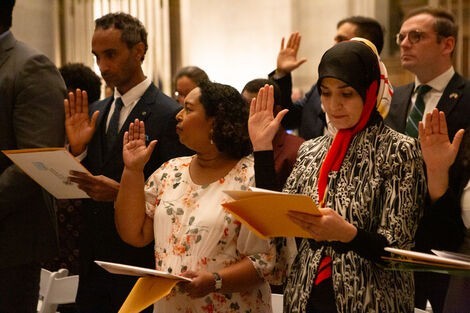
There has been much talk these days about citizenship, especially the long-standing concept of birthright citizenship, which grants citizenship to those born of undocumented migrants while residing in the United States. While birthright citizenship works its way through the federal courts in response to the Trump administration’s effort to end this constitutional precedent, it is important to reflect on what citizenship in the United States means beyond the ability of the children of illegal immigrants to declare themselves Americans.
Normally, citizenship in the United States has traditionally been linked to more mundane responsibilities such as obeying the laws of the land, voting in elections, paying taxes, showing up for jury duty, and pledging allegiance to the country and to the constitution. But as we live through some of the most difficult and controversial times in our country it may be important to talk about some of the ways that we as Americans can redefine what it means to be a good citizen as we head towards the 250th anniversary of our independence as a nation.
Redefining good citizenship in 2025 has much to do with how we as Americans interpret and apply the words of President John F. Kennedy who stated in his memorable speech at his inauguration, “Ask not what your country can do for you, ask what you can do for your country.” It was clear from Kennedy’s words that good citizenship involves service, whether it is service as a member of the armed forces, police, fire and education, service as a community volunteer, service as a protector of American values such as equality, freedom, justice and opportunity, and service as a contributor to the common good and the national interest. Each of these service activities requires more than just showing up on election day or at the courthouse for jury duty or at city hall to pay taxes. Good citizenship requires action, involvement, respect, fairness and above all patriotism, not just in flag-waving and singing the national anthem but rather a deep commitment to the words of the Declaration of Independence, “We hold these truths to be self-evident, that all men are created equal, that they are endowed by their creator with certain inalienable rights, that among these rights are Life, Liberty and the pursuit of happiness.”
If we indeed seek to be good citizens and make good citizenship relevant in 2025 it is necessary to ask ourselves what we can do to protect these sacred Truths of the Declaration of Independence? Sadly, we live in a time when too many Americans just don’t seem to take an interest in giving back to the country, they say they love. Good citizenship is failing in America as we have lost the commitment to be informed about civic life and the importance of good government, we have lost the desire to become active members of the community they live in, and we have become unwilling to speak out about the threats to equality, freedom, justice and opportunity. We suffer from what can be called “National Indifference,” a damaging disease that is marked by self-centeredness, political ignorance, inane pop culture lifestyles, TikTok education, and a blind unwillingness to get off the couch and do something, anything that benefits the community and the nation.
A nation can’t move away from our current indifference with slogans and promises of greatness if citizens are glued to phony advice on the Internet, deaf and dumb from headphone overload, and firm believers of every conspiracy theory that is launched by the charlatans of the right and the left. If we are to follow the words of John F. Kennedy and the values laid out in the Declaration of Independence, then we must follow some very citizen-friendly advice. First, pay attention to the world around you that does not involve a professional athletic team or pop star; second, leave the house in the evening hours and attend a community meeting instead of watching television violence or worse yet Wheel of Fortune, and third, spend some time becoming informed about the men and women in our nation’s history who were responsible for really “Making America Great.”
Being a good citizen is not that difficult or time consuming; it is rather a commitment to become an active, involved and dedicated American who wants to improve the lives and the living conditions of all their neighbors and friends, no matter their race, ethnicity, religion or gender definition. Most importantly, being a good American and good citizen is the realization that citizenship is a two-way street and a binding social contract — we get something from the government whether it is security, opportunity and benefits, but also we give back to the country by doing good for our neighbors and fellow Americans. The great men and women who were our nation’s best citizens lived a life that sought to advance the common good, creating a country where everyone can participate equally in the American dream. This is what being a good citizen in 2025 means today.